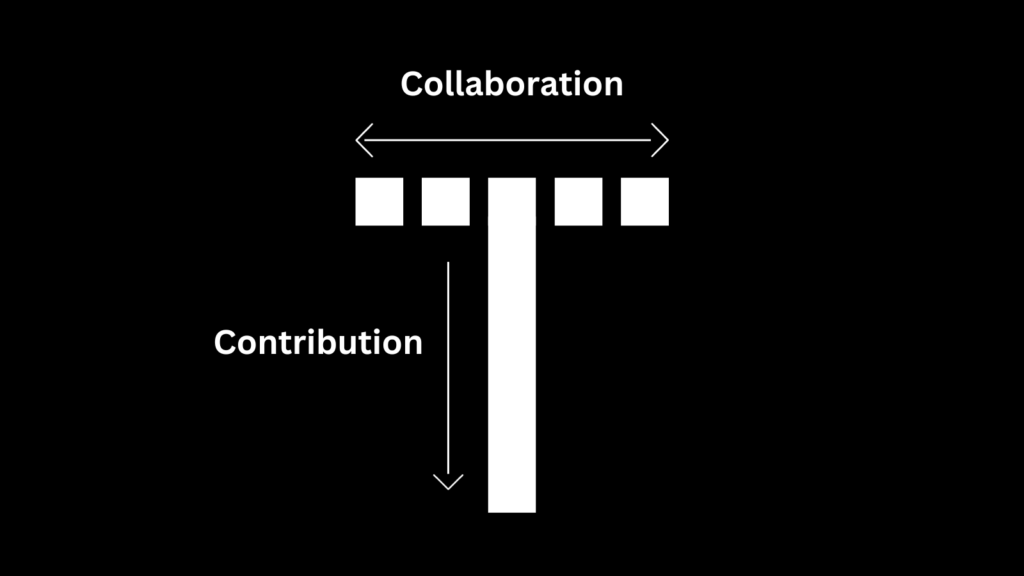For the past few years, the term ‘T-shaped marketer’ has been popularized and many marketers nowadays strive to become one. This is an awesome thing because the world needs more of them and it is a good way of future-proofing your career.
T-shaped marketers are the ideal growth hackers due to their unique combination of deep expertise in a specific area and a broad understanding of various marketing disciplines. This versatility allows them to think strategically and execute tactically while driving growth in a chaotic, dynamic, and highly competitive industry.
The T-Shaped Model Explained
The premise of the concept is fairly easy. Obviously, the best way of understanding it is to imagine a ‘T’ shape. In this shape, the vertical line represents the depth of knowledge in a specific area of marketing channels, such as SEO, Paid Search, or social media.
The horizontal line represents the broad understanding of various (marketing) disciplines such as branding, customer experience, analytics, public relations, or consumer psychology. This width allows T-shaped marketers to connect their main expertise to the broader marketing landscape and collaborate more easily with others.

The Base Knowledge
T-shaped marketers require a solid foundation of essential skills to excel in their roles. This will help them to manage all sorts of situations and come up with solutions that take into account multiple perspectives. These skills include:
Growth Mindset
T-shaped marketers need to have a growth mindset. This means always looking for new things to learn and get better at. To do this, you need to be able to bounce back from problems and not get too upset about challenges. See them as chances to improve.
This “fail fast and learn” thinking helps you get better faster, like a startup company. A curious mind helps T-shaped marketers stay on top of new ideas and trends. That way you keep up with the always-changing world of marketing.
Data Analytics
T-shaped marketers need to understand data to make good choices and get better outcomes. They must be good at statistical methods to measure marketing, see trends, and improve campaigns.
They also need to clearly and convincingly present data to stakeholders, since people often don’t understand numbers well. By making data easy to understand through visualizations and telling the story behind the data, T-shaped marketers can easily share what they learned and drive action.
Strategic Planning
Marketers with a T-shaped skill set must know how to create comprehensive and effective marketing strategies. They know the relationship between strong channels and tactics and how to include them in the marketing mix.
They’ve also got a handle on the impact of those channels and tactics in the business context. And this is really what a solid marketing strategy is all about: leveraging the marketing mix to move the business toward its goals.
So, they use the marketing mix to reach more customers in more varied and more effective ways than ever before.
Problem-Solving
T-shaped marketers must think creatively and innovatively to resolve marketing challenges. To do that, they have to be able to deconstruct a problem down to its fundamental level to understand it properly. After that, they have to find solutions, workarounds, or ways to cut corners to speed up implementation.
A good T-shaper marketer does not only understand the problem thoroughly. They also have a good reaction time and are able to make fast decisions. This is because an excellent solution to a problem is useless if it isn’t implemented fast.
Behavioral Psychology
Understanding behavioral psychology concepts is a must for any good marketer. This doesn’t mean that they must be psychologists or social scientists. The essence of basic behavioral psychology (what makes people tick) can easily be understood and applied by anyone.
You will only need to know 2 things:
- What your customers want and how they think. You can discover this through customer research, interviews, or even from the reviews they leave.
- How they behave. For this, you can do a deep dive into the data you have at hand and see how your customers interact with your business.
The Marketing Foundation
Note that a T-shaped marketer doesn’t need to do all the work by themselves. So they don’t need to have expertise in tens of marketing areas. But knowing what needs to be done (and maybe how) will improve the collaboration with the others. So, let’s look at the marketing foundation you should be aiming for:
Rapid experimentation
T-shaped marketers need to be fast and efficient when carrying out experiments. They can’t afford to waste time when developing new campaign ideas or optimizing the old ones. The command “Think fast! Act fast!” applies here.
Automation
An indispensable skill in marketing is automation. Regardless if you are using tools for it or building your own scripts, you need to know how to do it.
When automating repetitive tasks, you are winning yourself some time, but also reducing the risk of human errors. Besides the already heavily automated email campaigns, social media post-scheduling or chatbots, you can let your creativity loose. Think of all the possibilities you have with the no-code automation tools that are on the market.
Attribution modeling
This is something T-shaped marketers need to grasp if they want to measure the effects of various marketing channels. It allows them to look at the multitouch nature of today’s customer journey and make sense of it.
Marketers can then go one step further, using this information to make better decisions about where to spend their budget.
Product Marketing
Another area they should at least have a basic comprehension of is product marketing. Product marketing is all about placing a product or service in the correct spot on the market and then promoting it to the right audience.
Then there’s the marketing materials that get created, and the use of sales teams to make things happen and drive revenue.
Copywriting
Communicating the essence of your product or service to potential customers is key. In this context, copywriting is not just about creating pretty sentences; it’s about creating the right sentences that will persuade the right people to take the right actions.
For a T-shaped marketer, being able to write well is the most valuable tool they can have in their kit. Whether it’s website content, email campaigns, or social media posts, if the words fail, so does the marketing plan.
Channel expertise
Every marketer I have met has one thing in common: they have extensive knowledge of a particular marketing channel. And the good ones, have a pretty good knowledge of other channels.
And again, they don’t need to be experts in these other channels. They need to know enough to communicate with other specialists effectively.
So, let’s look at a few of these channels:
Paid Search
Bidding on keywords to get to the top of the search engine results pages (SERPs) is what paid search (also called pay-per-click or PPC) is all about. It has some very straightforward advantages: You reach people who are actually searching for what you offer, and you get more or less instant visibility.
SEO
Search Engine Optimization, or SEO, is the process of getting a website to rank higher on the search engine result pages (SERPs) for the keywords deemed significant to the business.
Paid Social
This involves running ads on Facebook, Instagram, LinkedIn, TikTok, or any other social media platform. The advantage here is that you can target people based on their interests. So they don’t necessarily have to actively look for your product or service.
Email marketing
Email marketing is a very effective tool. It is mostly used for nurturing leads, promoting products or services, or building customer relationships. And because it’s pretty much free, it has a very low cost-per-conversion so it’s very profitable.
Conversion Rate Optimization
This involves making changes to a website or a landing page to increase conversion rates. CRO is like a three-step dance: you analyze the user behavior, identify the zones of friction, and make the necessary changes to encourage/make it easier for users to take action.
Social Media Marketing
This uses social media to promote a business. It is usually effective for B2C companies but can also work for B2B companies. Social media marketing involves creating and sharing content to attract new customers and build a following.
Referral marketing
Satisfied customers are the best salespeople. Referral marketing is the art and science of getting these satisfied customers to talk about you. In the past, if a product made a person happy, that person would tell a few others about it.
Nowadays, through social media, a person who is very happy with your product can tell thousands, if not millions, of people about it. And a key part of why this works is that people trust recommendations from friends and family way more than they trust advertising.



